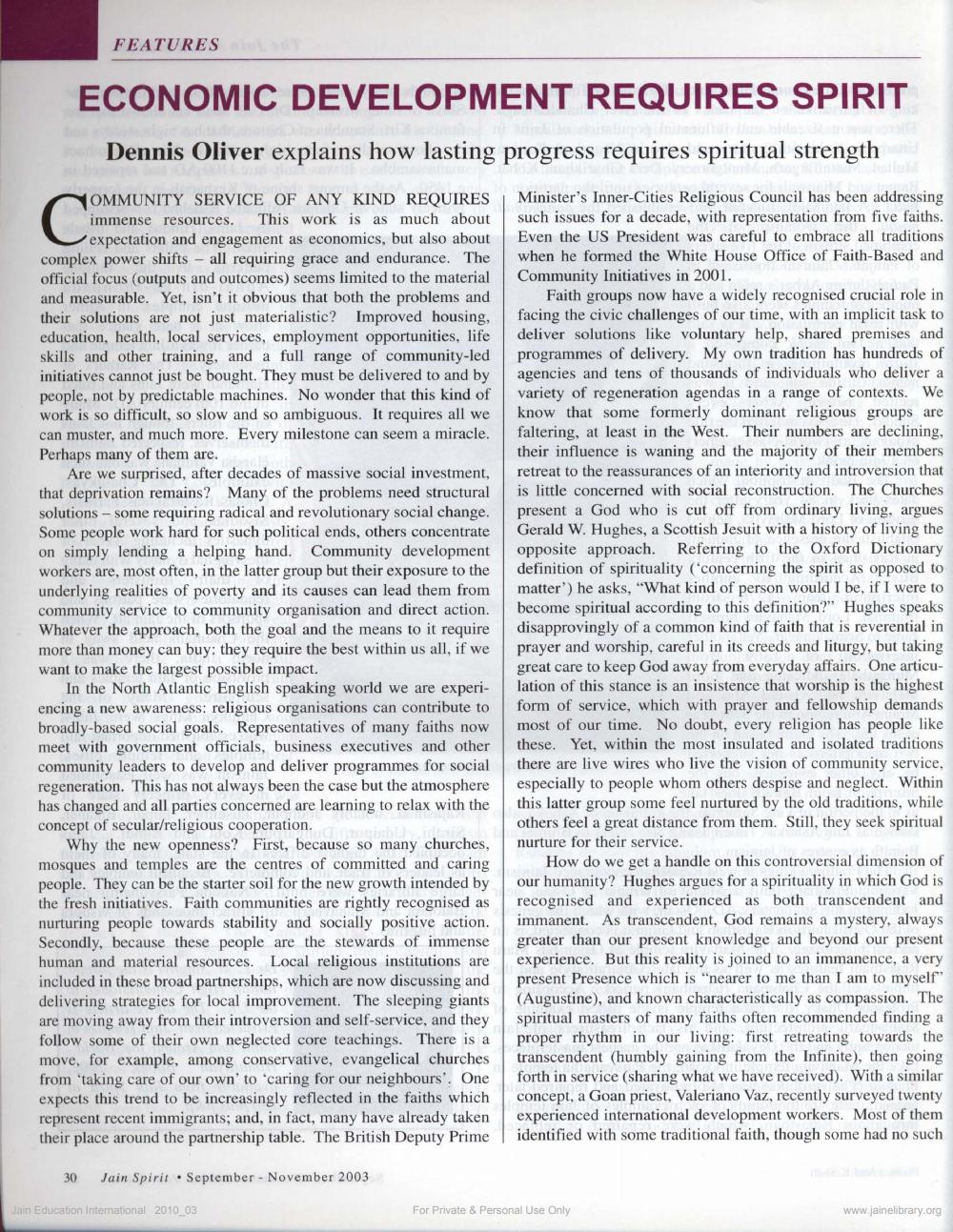________________
FEATURES
ECONOMIC DEVELOPMENT REQUIRES SPIRIT
Dennis Oliver explains how lasting progress requires spiritual strength
OMMUNITY SERVICE OF ANY KIND REQUIRES immense resources. This work is as much about
expectation and engagement as economics, but also about complex power shifts - all requiring grace and endurance. The official focus (outputs and outcomes) seems limited to the material and measurable. Yet, isn't it obvious that both the problems and their solutions are not just materialistic? Improved housing, education, health, local services, employment opportunities, life skills and other training, and a full range of community-led initiatives cannot just be bought. They must be delivered to and by people, not by predictable machines. No wonder that this kind of work is so difficult, so slow and so ambiguous. It requires all we can muster, and much more. Every milestone can seem a miracle. Perhaps many of them are.
Are we surprised, after decades of massive social investment, that deprivation remains? Many of the problems need structural solutions - some requiring radical and revolutionary social change. Some people work hard for such political ends, others concentrate on simply lending a helping hand. Community development workers are, most often, in the latter group but their exposure to the underlying realities of poverty and its causes can lead them from community service to community organisation and direct action. Whatever the approach, both the goal and the means to it require more than money can buy: they require the best within us all, if we want to make the largest possible impact.
In the North Atlantic English speaking world we are experiencing a new awareness: religious organisations can contribute to broadly-based social goals. Representatives of many faiths now meet with government officials, business executives and other community leaders to develop and deliver programmes for social regeneration. This has not always been the case but the atmosphere has changed and all parties concerned are learning to relax with the concept of secular/religious cooperation.
Why the new openness? First, because so many churches, mosques and temples are the centres of committed and caring people. They can be the starter soil for the new growth intended by the fresh initiatives. Faith communities are rightly recognised as nurturing people towards stability and socially positive action. Secondly, because these people are the stewards of immense human and material resources. Local religious institutions are included in these broad partnerships, which are now discussing and delivering strategies for local improvement. The sleeping giants are moving away from their introversion and self-service, and they follow some of their own neglected core teachings. There is a move, for example, among conservative, evangelical churches from 'taking care of our own' to 'caring for our neighbours'. One expects this trend to be increasingly reflected in the faiths which represent recent immigrants; and, in fact, many have already taken their place around the partnership table. The British Deputy Prime
Minister's Inner-Cities Religious Council has been addressing such issues for a decade, with representation from five faiths. Even the US President was careful to embrace all traditions when he formed the White House Office of Faith-Based and Community Initiatives in 2001.
Faith groups now have a widely recognised crucial role in facing the civic challenges of our time, with an implicit task to deliver solutions like voluntary help, shared premises and programmes of delivery. My own tradition has hundreds of agencies and tens of thousands of individuals who deliver a variety of regeneration agendas in a range of contexts. We know that some formerly dominant religious groups are faltering, at least in the West. Their numbers are declining, their influence is waning and the majority of their members retreat to the reassurances of an interiority and introversion that is little concerned with social reconstruction. The Churches present a God who is cut off from ordinary living, argues Gerald W. Hughes, a Scottish Jesuit with a history of living the opposite approach. Referring to the Oxford Dictionary definition of spirituality ('concerning the spirit as opposed to matter) he asks, "What kind of person would I be, if I were to become spiritual according to this definition?" Hughes speaks disapprovingly of a common kind of faith that is reverential in prayer and worship, careful in its creeds and liturgy, but taking great care to keep God away from everyday affairs. One articulation of this stance is an insistence that worship is the highest form of service, which with prayer and fellowship demands most of our time. No doubt, every religion has people like these. Yet, within the most insulated and isolated traditions there are live wires who live the vision of community service, especially to people whom others despise and neglect. Within this latter group some feel nurtured by the old traditions, while others feel a great distance from them. Still, they seek spiritual nurture for their service.
How do we get a handle on this controversial dimension of our humanity? Hughes argues for a spirituality in which God is recognised and experienced as both transcendent and immanent. As transcendent, God remains a mystery, always greater than our present knowledge and beyond our present experience. But this reality is joined to an immanence, a very present Presence which is "nearer to me than I am to myself (Augustine), and known characteristically as compassion. The spiritual masters of many faiths often recommended finding a proper rhythm in our living: first retreating towards the transcendent (humbly gaining from the Infinite), then going forth in service (sharing what we have received). With a similar concept, a Goan priest, Valeriano Vaz, recently surveyed twenty experienced international development workers. Most of them identified with some traditional faith, though some had no such
30
Jain Spirit . September - November 2003
Jairi Education International 2010_03
For Private & Personal Use Only
www.jainelibrary.org




